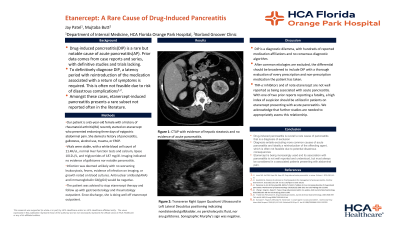Back


Poster Session E - Tuesday Afternoon
Category: Biliary/Pancreas
E0067 - Etanercept: A Rare Cause of Drug-Induced Pancreatitis
Tuesday, October 25, 2022
3:00 PM – 5:00 PM ET
Location: Crown Ballroom

Has Audio
- JP
Jay Patel, MD
Orange Park Medical Center
Orange Park, FL
Presenting Author(s)
Jay Patel, MD1, Mujtaba Butt, MD2
1Orange Park Medical Center, Orange Park, FL; 2Borland Groover, Orange Park, FL
Introduction: Despite causing as low as 0.1% of cases of acute pancreatitis(AP), drug-induced pancreatitis(DIP) is a growing and notable cause of AP. Prior data comes from case reports and series, with definitive studies and trials lacking. To definitively diagnose DIP, a latency period with reintroduction of the medication associated with a return of symptoms is required. This is often not feasible due to risk of disastrous complications. DIP presents an uncommon cause of AP, with no established diagnostic algorithm. Amongst these cases, etanercept-induced pancreatitis presents a rare subset rarely reported in the literature.
Case Description/Methods: Our patient is a 65-year-old female with a history of rheumatoid arthritis(RA) who presented endorsing three days of epigastric abdominal pain. Labs indicated a normal liver function tests, calcium of 10.1mg/dl, lipase of 1012U/L, and triglycerides of 187 mg/dl. Abdominal imaging indicated hepatic steatosis, with no findings of AP nor notable biliary/gallbladder pathology. Patient was started on fluids with clinical improvement noted. Antinuclear antibody(ANA) and immunoglobulin G4(IgG4) would be negative. The patient was advised to stop etanercept therapy and follow up with gastroenterology and rheumatology outpatient. She has since been discharged and is doing well off etanercept outpatient.
Discussion: Since being first reported in the 1950s, DIP has been associated with over 500 medications per the World Health Organization. It is a diagnosis of exclusion, with common etiologies of alcohol abuse, gallstone disease, and other metabolic derangements having to be ruled out first. TNF-𝛼 inhibitors are involved in the treatment of a variety of autoimmune conditions. AP is not a commonly reported effect of these medications. Limited prior case reports attribute pancreatitis to infliximab and adalimumab use. To our knowledge, there are only two prior case reports of AP in the setting of recent etanercept initiation. After excluding more common causes of AP via imaging and labs, medication review was only notable for etanercept, which was started recently. A variety of mechanisms for DIP have been proposed. These include pancreatic/biliary duct constriction, direct cytotoxic effects, metabolic effects, and accumulation of potentially toxic metabolites. We hope to bring greater awareness to etanercept as a cause of drug-induced pancreatitis. Further studies are needed to elucidate its association with pancreatitis.
Disclosures:
Jay Patel, MD1, Mujtaba Butt, MD2. E0067 - Etanercept: A Rare Cause of Drug-Induced Pancreatitis, ACG 2022 Annual Scientific Meeting Abstracts. Charlotte, NC: American College of Gastroenterology.
1Orange Park Medical Center, Orange Park, FL; 2Borland Groover, Orange Park, FL
Introduction: Despite causing as low as 0.1% of cases of acute pancreatitis(AP), drug-induced pancreatitis(DIP) is a growing and notable cause of AP. Prior data comes from case reports and series, with definitive studies and trials lacking. To definitively diagnose DIP, a latency period with reintroduction of the medication associated with a return of symptoms is required. This is often not feasible due to risk of disastrous complications. DIP presents an uncommon cause of AP, with no established diagnostic algorithm. Amongst these cases, etanercept-induced pancreatitis presents a rare subset rarely reported in the literature.
Case Description/Methods: Our patient is a 65-year-old female with a history of rheumatoid arthritis(RA) who presented endorsing three days of epigastric abdominal pain. Labs indicated a normal liver function tests, calcium of 10.1mg/dl, lipase of 1012U/L, and triglycerides of 187 mg/dl. Abdominal imaging indicated hepatic steatosis, with no findings of AP nor notable biliary/gallbladder pathology. Patient was started on fluids with clinical improvement noted. Antinuclear antibody(ANA) and immunoglobulin G4(IgG4) would be negative. The patient was advised to stop etanercept therapy and follow up with gastroenterology and rheumatology outpatient. She has since been discharged and is doing well off etanercept outpatient.
Discussion: Since being first reported in the 1950s, DIP has been associated with over 500 medications per the World Health Organization. It is a diagnosis of exclusion, with common etiologies of alcohol abuse, gallstone disease, and other metabolic derangements having to be ruled out first. TNF-𝛼 inhibitors are involved in the treatment of a variety of autoimmune conditions. AP is not a commonly reported effect of these medications. Limited prior case reports attribute pancreatitis to infliximab and adalimumab use. To our knowledge, there are only two prior case reports of AP in the setting of recent etanercept initiation. After excluding more common causes of AP via imaging and labs, medication review was only notable for etanercept, which was started recently. A variety of mechanisms for DIP have been proposed. These include pancreatic/biliary duct constriction, direct cytotoxic effects, metabolic effects, and accumulation of potentially toxic metabolites. We hope to bring greater awareness to etanercept as a cause of drug-induced pancreatitis. Further studies are needed to elucidate its association with pancreatitis.
Disclosures:
Jay Patel indicated no relevant financial relationships.
Mujtaba Butt indicated no relevant financial relationships.
Jay Patel, MD1, Mujtaba Butt, MD2. E0067 - Etanercept: A Rare Cause of Drug-Induced Pancreatitis, ACG 2022 Annual Scientific Meeting Abstracts. Charlotte, NC: American College of Gastroenterology.
